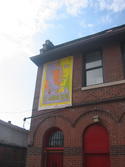Newgeography.com - Economic, demographic, and political commentary about places
In the end Appalachia remained out of sync with much of America this year. West Virginia, Kentucky, Tennessee and much of the hill country went for John McCain. Senator’s Obama’s message of “hope” did not play as well here as elsewhere.
This may seem a bit odd. The major targets of the election were Joe six-pack, Joe the plumber; Joe the ordinary man. Joe represented the disaffected males, the lost ones yearning for a simpler time and a better time. Enough Joes in other states voted for Obama to get him a spectacular victory in places like Ohio, Florida and Michigan. read more »
The keystone of the McCain campaign’s victory scenario during the final weeks was a surprise victory in Pennsylvania despite that fact that polls (Real Clear Politics had the gap at 7 points on Election Day) clearly showed Obama comfortably ahead. Why?
Pennsylvania has a Democratic Governor from Philadelphia who was elected twice with sizable margins. Democrats have gotten a big boost over the past two years in voter registration. The political shift from Republican to Democratic in the Philadelphia suburbs is nearly complete – at least when it comes to statewide and federal offices. read more »
Barack Obama rode to his resounding victory on the enthusiasm of two constituencies, the young and African Americans, whose support has driven his candidacy since the spring. Yet arguably the biggest winners of the Nov. 4 vote are located at the highest levels of the nation's ascendant post-industrial business community.
Obama's triumph reflects a decisive shift in the economic center of gravity away from military contractors, manufacturers, agribusiness, pharmaceuticals, suburban real estate developers, energy companies, old-line remnants on Wall Street and other traditional backers of the GOP. In their place, we can see the rise of a different set of players, predominately drawn from the so-called "creative class" read more »
By Morley Winograd and Michael D. Hais
Senator Barack Obama’s success in the 2008 presidential campaign marks more than an historical turning point in American politics. It also signals the beginning of a new era for American society, one dominated by the attitudes and behaviors of the largest generation in American history.
Millennials, born between 1982 and 2003, now comprise almost one-third of the U.S. population and without their overwhelming support for his candidacy, Barack Obama would not have been able to win his party’s nomination, let alone been elected President of the United States. This new, “civic” generation is dramatically different than the boomers who have dominated our society since the 1960s and understanding this shift is critical to comprehending the changes that America will experience over the next forty years. read more »
There are two definitive differences between St. Louis and Los Angeles: Autumn is better in St. Louis, and more people speak Spanish in Los Angeles. And, yeah, there’s the Mississippi River and the humidity and the beach and the film industry and the palm trees, but in terms of my own private geography and topophilia, autumn and Spanish are the differences that matter. I long for LA in every season but fall, and a part of my longing is, inevitably, a longing for Spanish. read more »
With Barack Obama possibly becoming the next President, it’s time to look at the Senator’s hometown. The Senator may have talked a great deal about change as a candidate, but to a large extent he has worked closely with what may be one of the most corrupt political cultures in America. read more »
For the past week an irritating little tune has bounced into my head unexpectedly every time I turned to news about the financial collapse. The melody would then remain at the edge of my consciousness for hours at a time like a buzz or a hum in my ear. Though I couldn’t make out the lyrics, I could distinguish the distinct nasal whine that Rex Harrison affected in the musical My Fair Lady. Still, I couldn’t pin down which song was playing on an endless loop in my head. Instead, as I made my way through the Kotokuraba Market in Cape Coast, Ghana, this past week, I found myself absentmindedly substituting my own lyrics to the Frederick Loewe score. At first I sang the line “If only Lehman Brothers was more like the Man! Know Thyself Pharmacy,” and then “If only AIG could be more like Is Not By Might Alone Construction.” Though my feeble attempt did not come close to scanning, I knew immediately that I was onto something. read more »
It’s interesting to look at 2000 presidential election results from some extreme counties, contrasting the most Republican and the Democratic areas, and compare them to some areas that voted 50:50 in 2004. I’ll look at 7 counties of each kind, illustrating the peculiar geography of American partisanship. The Republican and the Democratic areas will not change much, but it will be fascinating to see what happens to the even split areas of 2004. Do look them up in your road atlas and on the web for more detail! read more »
Initially San Francisco and the Bay Area market seemed to be immune to the financial meltdown resulting from the mortgage crisis. After all, the City and its accompanying affluent suburbs had not suffered drastic drops in home prices as seen in many other regions of the country. Yet as the mortgage crisis has snowballed into a complete meltdown of the worldwide financial system, the poster child of the ‘new economy’ now appears less and less immune from the turmoil dominating our news headlines.
The region that consists of the City by the Bay and the adjacent Silicon Valley is no stranger to drastic market corrections. read more »
Just months ago, urban revivalists could see the rosy dawn of a new era for America's cities. With rising gas prices and soaring foreclosures hitting the long-despised hinterland, urban boosters and their media claque were proclaiming suburbia home to, as the Atlantic put it, "the next slums." Time magazine, the Financial Times, CNN and, of course, The New York Times all embraced the notion of a new urban epoch.
Yet in one of those ironies that markets play on hypesters, the mortgage crisis is now puncturing the urbanists' bubble. The mortgage meltdown that first singed the suburbs and exurbs, after all, was largely financed by Wall Street, the hedge funds, the investment banks, insurers and the rest of the highly city-centric top of the paper food chain. read more »
|






















